Arenas for Achieving : PH'1Q
The focus in this section is on the Architecture, psychosocial pressures, and determining names, not on specific frameworks enabling practical use of particular Arenas. So there will be minimal specifications or explanations of properties and applications.
Orientation
The is dominated by the pressure for performanceand meets the Primal Need for achievement.
Achieving is a requirement of some enterprise, large or small. The autonomy pressures, explained earlier as generators of the , are mobilized by and lead to the expectation of managerial .
In attempting to identify and name the , we will use a similar approach to that used to identify the . We start with the 4 decision styles and roles of the lower Method to identify the Arena, and then consider whether the upper Method naturally serves as an enabling and controlling context.
In all cases we are focused on a project, operation, or enterprise of some sort.
Naming the Arenas
Q1
will handle that is dependent on using the styles of professionals, administrators, politicians and planners in order for managers to learn.
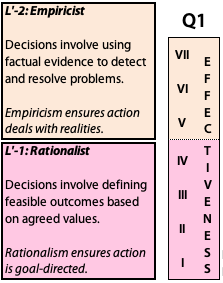
Proposed Q1 Arena Name: «» of the enterprise.
style approaches and outputs can both direct and check on outcomes, and that naturally serve as an enabling and controlling context.
Performance will be the primary pressure in . A failure in performance will activate questioning of , and all higher Arena levels:
Q2
will handle dependent on questioning using the styles of monitors, experts, investigators and evaluators in order for managers to learn.
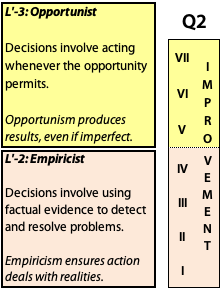
Proposed Q2 Arena Name: «» of the enterprise.
style approaches and outputs can ensure that collecting ever more data and doing ever more analyses will not paralyze the enterprise, so it servers naturally as an enabling and controlling context.
Certainty will be the primary pressure in . Uncertainty about performance and persistence of problems will activate and all higher Arena levels:
Q3
will handle dependent on questioning using the styles of doers, organizers, advisors and bosses in order for managers to learn.
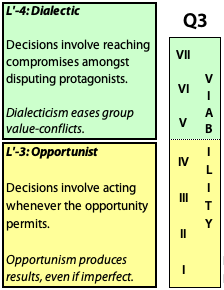
Proposed Q3 Arena Name: «» of the enterprise.
style approaches are required as a context because the reality requiring urgent engagement is inherently uncertain and any potentially appropriate response will engender disputes.
Acceptability will be the primary pressure in . The enterprise here is facing a crisis, possibly existential, and yet all parties will not respond to demands and impositions if they do not find them acceptable. Lack of acceptability will activate new and all higher Arena levels:
Q4
will handle dependent on questioning using the styles of mediators, negotiators, debaters and arbitrators in order for managers to learn.
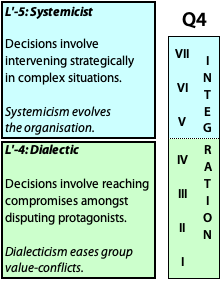
Proposed Q4 Arena Name: «» for the enterprise.
style approaches ensure that viewpoints of particular protagonists or enterprise sections are fully respected while being kept subservient to the need for balanced development of the whole. This balancing act enables and controls any resolution or plan.
Well-Being will be the primary pressure in . High morale is desirable in any enterprise and if it is lacking, then this will activate efforts at and all higher Arena levels:
Q5
will handle dependent on questioning using thestyles of modellers, analysts, participants and strategists in order for managers to learn.
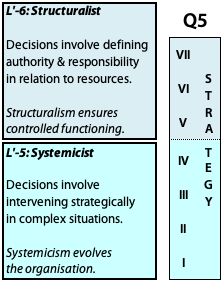
Proposed Q5 Arena Name: «» for the enterprise.
style approaches ensure a disciplined allocation of duties and strict accountability. Without this enabling and controlling context, any leadership effort will quickly go awry.
Understandingwill be the primary pressure in . Unless the leader understands the situation, the people and the possibilities, the enterprise will stagnate. If understanding is lacking, is impossible; and the application of strategies in ways will be unsatisfactory.
Q6
will handle dependent on questioning using thestyles of managers, coordinators, specialists and leaders in order for managers to learn.
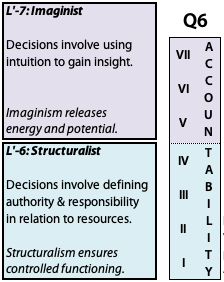
Proposed Q6 Arena Name: «» for the enterprise.
style approaches would naturally serve as an enabling and controlling context, because individuals driven by commitment and aspirations within their role and responsibilities will exercise influence most effectively.
Autonomywill be the primary pressure in . The assignment and exercise of authority are powers that allow individuals to exercise their autonomy safely. Without autonomy, authority becomes a sham. Autonomy is also intrinsic to the exercise of methods..
Q7
will handle dependent on questioning using the styles of facilitators, educators, counsellors and visionaries in order for managers to learn.
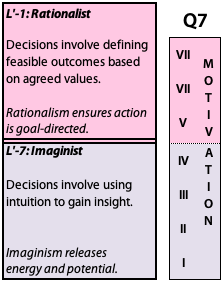
Proposed Q7 Arena Name: «» for the enterprise.
style approaches ensure there is a consensus on direction and priorities, which naturally serves as an enabling and controlling context for inputs like aspiration and commitment.
Selflessnesswill be the primary pressure in . In all the Arena components, individuals are exhorted and expected to apply their energies to benefit the enterprise, and not to think of themselves except in terms of what they can contribute.
Secondary Psychosocial Pressures
In the , a series of secondary pressures for each Arena was identified and the pattern was confirmed in PH'5Q-Associating Arenas. The primary pressures appear to relate to the form or structure of the Arena, while the secondary pressures relate to the contents or processes within the Arena
All these are about putting a premium on achieving when learning as part of managing.
The is about and its primary pressure is performance as explained above.
But those involved in becoming more productive are required to . This would seem to generate a secondary pressure for understanding, without which it would be hard for anything to happen.
The is about and its primary pressure is certainty as explained above.
But those who are developing improvement are required to accept. This would seem to depend on a secondary pressure for performance—with work, work arrangements and work expectations having the top priority.
The is about and its primary pressure is acceptability as explained above.
But those who instigate urgent changes to protect viability are involved in . These activities have to be sure to work, and that means they operate under a secondary pressure for selflessness.
The is about and its primary pressure is well-being as explained above.
But those seeking to develop cohesion via dialectic-holistic styles and working to and would be likely to find all efforts are subject to participants and groups being affected by a secondary pressure for autonomy.
The is about and its primary pressure is understandingas explained above.
But those using holistic-structuralist styles to develop a strategy would likely experience a secondary pressure for certainty from others who must sanction and implement the strategy. All base components attempt to depict the current situation and its evolution accurately; and the application of strategies in ways builds on that certainty.
The is about and its primary pressure is autonomyas explained above.
But using structuralist-imaginist styles to ensure influence assumes impartiality, fairness and that people enjoy their work. All and efforts, as well as and seek to create a positive experience. So there is a secondary pressure for well-being.
The is about and its primary pressure is selflessnessas explained above.
Those developing motivation via imaginist-rationalist styles ask people to look into themselves. The Arena includes and would likely operate under a secondary pressure for acceptability because this fosters personal motivation.
Comparing patterns of pressures to this point, the findings are identical to those developed for the Arenas of and .
- Now examine the PH'4Q Individualizing Arenas.
Originally posted: 24-Sep-2022. Last updated: 12-Mar-2023.
